This post is as much for the ELT people as for the Taiwan folks (I'm betting the Taiwan readers, especially the other English teachers, will not need a lengthy blog post about this topic - they'll know immediately where I'm coming from).
I've been asked a few times why I freelance, when ostensibly I am a supporter of labor - not just that, but organized labor, labor that treats its own capital (that is, the work it can provide) the way corporations treat theirs - in an organized way to get the best benefit from it. I strongly support professional development and paid training, paid leave, parental leave benefits, and retirement benefits/pensions for workers as a part of a basic salary package. I also support national health insurance, but don't think that needs to be tied to employment. I am exactly the sort of person who wants the benefits working for an organization - being a formal employee - would bring. I'm the sort who would join a union and be active in it.
While I enjoy the benefits of freelancing - control over my schedule, no real "boss" per se, the confidence that comes with knowing I can create an income on my own without having an organization offer me employee status - I don't automatically gravitate to a lifestyle of billable-hour income and no benefits. A fixed salary and paid leave sure sound nice, especially on an academic calendar.
So why, then, have I chosen not to be employed by anybody? Why don't I pick a full-time job and stick with it? I've said several times on this blog that my two main employers are both pretty good - why not pick one and be their employee, rather than keeping both somewhat at arm's length?
And the reason is simple - my two employers (as in, not private students but organizations that give me group classes) are good, by industry standards. The industry as a whole, however, is not. I won't even qualify that with an "in Taiwan" because it's more of a global problem.
No job exists in Taiwan that is tempting enough for me to want to work it full-time. No job offers adequate pay along with the benefits I'd expect from a full-time employer. Why would I commit myself to one organization full-time when, honestly, here is a list of things I would not receive:
- Paid leave (although this is technically something we are legally entitled to, there is no realistic way to claim it and keep your job) if one is paid an hourly rate
- Additional job security including guaranteed hours
- Any sort of pension or retirement plan or benefit
- Better pay
- In many cases, a salary instead of hourly-rate work
- If salaried, a suitably high salary with reasonable hours. I'm not lazy, I work hard, but I want good money for that sort of commitment, and no amount of money will make me agree to work over 40 hours a week (and no salary I've seen on offer for English teachers adequately compensates 40 hours' worth of work)
- Paid professional development
So what is the benefit to becoming a full-time employee if it means committing myself, and getting nothing in return that I don't already give myself by freelancing?
What this boils down to is a problem of jobs not being good enough, which is an industry problem. I rather like both of my employers - they're the best I've found in the industry, to be frank. I have no complaint with them. They are generally staffed by good people. But, the story is the same: hourly pay, no paid vacation (which, again, is technically illegal in Taiwan but try getting them to give it to you and also keep your job, or good relations at your job), no guarantee of hours, no extra security or other benefits. Perhaps slight preference in hours offered, that's it. The salaried jobs that exist are for desk work, which I got into teaching partly to avoid. These are probably among the best jobs available in Taiwan, but what they offer still doesn't beat freelancing.
Pretty often, I hear "if people are taking the jobs, then that's all the employers need to offer" - okay, so what happens when experienced, qualified teachers stop taking the jobs, because they're unsatisfactory, and go it on their own? At that point, does it become clear that if you can't attract talent, the jobs on offer aren't good enough?
Yes, university work exists (one reason I'm planning to do a Master's program is to explore this option, potentially) but the salaries aren't high for what ends up being a very high workload and poorly-organized classes - e.g. "speaking and conversation" classes with 65 students, which of course is a non-starter. You tend not to get benefits you'd otherwise associate with them, such as good paid CPD or a research budget.
Public school work exists, but is not a great option for those of us who want to teach adults. The pay isn't that high in those jobs, either (it is much higher in international schools but that's not helpful if one wants to focus on adults). There are some salaried government teaching jobs, but salaries for them are subject to the whims of the Ministry of Education (which at one point revised salaries down when they needed to go up) and have their own drawbacks.
None of these options are better than freelancing, either.
And doesn't it say that something is wrong with the job market when taking work with a few people and building up private classes is a better option as an experienced, trained educator than taking a traditional job, however much you might want one?
In theory, this post is about teaching in Taiwan, but I feel like it could be about almost anywhere. In what country do (trained, professional) private language academy teachers earn very good wages (commensurate with their professional status), get paid CPD and job security - guaranteed pay or hours or other benefits? In what country are university ESL/EAP teachers not only well-paid but also have other professional opportunities and room for growth? Outside of Asia pay seems to be ridiculously low, and within Asia no country pays its truly professional English language educators well in the private sector. In universities, pay in Korea and Japan is better, but there doesn't seem to be much room for growth - you get the job you get and you may never be promoted the way a local teacher might.
Is anywhere better? Or am I going to be a freelancer forever?
Tuesday, September 20, 2016
Wednesday, September 14, 2016
Pubic can grill his meat under the light of the moon if he wants
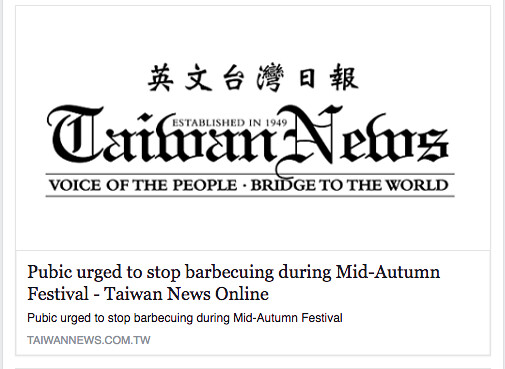
Just in case they fix the typo, here's a screenshot.
"Every year, local Taipei resident Pubic Wang barbecues
outside of his Songshan home.
'Barbecuing during Mid-Autumn Festival may not be a part of
our 5,000 years of culture, but ever since the tradition began it is one of the
best parts of the holiday,' he said.
Some neighbors disagreed. 'Every moon festival while I am
sitting at home watching TVBS and complaining about the young people and their
barbecues, I can smell the sizzling of Pubic's meat, especially when he puts
sauce on it.'
Asked for comment, Pubic replied, 'Auntie Ho is welcome to
come and eat my meat. I'm always happy to share.'"
* * *
In all seriousness, this is a stupid way to try to improve air quality. Air quality in Taiwan is affected by scooters, factories, ghost money (but not temple parades) and maybe a little bit from China, but not as much as you think. Moon Festival barbecues and such are not the problem and have never been the problem, so trying to stop them to improve air quality is not going to solve the problem. The same goes for temple festivals, by the way. Ghost money, sure, okay, it bothers some people and apparently scientific measurements indicate that it does affect air quality, but not the festivals themselves.
If you want to improve air pollution in Taipei, go after the scooters and the factories, not the barbecues and the parades. Don't be stupid.
Labels:
barbecue,
environmental_issues,
mid_autumn_festival,
news,
pollution
Wednesday, August 31, 2016
Five Reasons Why Ralph Jennings Is The Absolute Worst Journalist
This summary is not available. Please
click here to view the post.
Tuesday, August 16, 2016
Let's send the KMT to a nice farm upstate
| from here |
So, lots of articles since the election on the resounding defeat of the KMT, not only in elected office but as the clear loser in the current cultural zeitgeist. The KMT doesn't understand Taiwan, hasn't sufficiently 'Taiwanized', is trying and failing to imitate the Sunflower movement, is looking to rebrand itself to the youth...but what's to become of it? Why is it holding onto an anti-Taiwanese culture rhetoric that isn't working and is deeply out of touch with Taiwanese civil society? Can it reform itself? Is it or isn't it a 'monolith'?
(It isn't - no political party is, with very few exceptions. But I don't see how it matters if its various non-monolithic elements are still mostly either crappy or ridiculous).
At the heart of some, but not all, of these narratives is a worry that the KMT is doomed, that they will not successfully navigate the changed political and cultural landscape of Taiwan, in which their fusty old 'we are all Chinese / Three Principles of the People / we are the ones qualified to run Taiwan, not you provincials' values no longer have traction. Many - again, not all - of these articles seem to take it as a given that it would be a fundamentally good thing for the KMT to reform, to "Taiwanize", to finally divest itself of its authoritarian past.
I would like to make the argument, however, that it might not necessarily be a good thing - or at least, that it wouldn't be a bad thing - if the KMT really did sputter and die, and that perhaps Taiwan would be better off with an erstwhile, rather than active, Chinese Nationalist party.
Here's the thing - I do understand that it would be a political mess for most countries to rid themselves of every political party with an unsavory past. The US would have to shut down the Democratic and Republican parties. (Though again I'm not so sure it would be a bad idea to do so in the long run. An America free of these two entrenched establishment powerhouse parties might end up in a better place). I do understand the impulse to hope for the KMT to atone for its past crimes, as for the time being it's not going anywhere. Better an atoned party in the system than one that can't quite move on from its dictatorial past, I guess.
But wouldn't it be better yet if a party that was the core leadership of a mass-murdering dictatorship in living memory, that people don't call genocidal on what I would say is a semantic technicality (though let's not get into that argument again), did cease to exist? Why is the best case scenario for a reformed KMT, rather than a non-existent KMT?
I do take a very hard line view on this, because my family survived the Armenian genocide in Turkey. I view such crimes - the mass murder of the KMT among them - to be unforgivable. People ask "what does the KMT need to do to be treated as a legitimate party in today's political system? When will people stop bringing up the past and look at who they are today? What do they need to do to prove they are not the same party that they once were?"
(Not kidding, I've seen several people ask this in more or less these words).
I would say - there is nothing they can do. There is no forgiveness. There is no way to absolve yourself of mass murder. There is no way to absolve yourself of dictatorship. If a party engaged in these crimes, why should they be forgiven? Why should they be given another chance in a democratic nation? What have they done to deserve it? The government recognizes the crimes committed against the people and even has a holiday and two museums to commemorate it (though they are trying to shut one down), but the KMT as a party has never adequately apologized for its actions - nor am I sure the KMT ever could adequately apologize. They have not adequately released records from that era, they have not adequately made reparations to families, they have not adequately owned up to what they've done. Transitional justice in this regard has not been done. They still have the same old attitude of "well that was in the past, you'd best forget it and by the way, don't forget to vote for us, also please don't take away all of the assets we stole from you".
There simply is no forgiveness for something like the White Terror, so I don't see any reason why one should heed the "the past is the past, the KMT is different now" calls for tolerance. I am not tolerant of Armenian genocide apologists or deniers, so I see no reason to be tolerant of the party that in living memory committed mass murder among other crimes against the people in Taiwan. There is quite literally nothing they can do to remove that stain, nor should there be. As far as I'm concerned, if you perpetrate a crime against society on that scale, there is no going back, you do not deserve to exist or be any sort of political or ruling force.
What's more, why should we hope that they reform themselves from being the party of stolen assets which they fight against returning?
Why should we hope they reform themselves from being the party of compulsory party education and attempted brainwashing?
Why should we hope they reform themselves from being the party that had the chance to keep Taiwan in the UN as a non-security council participant, and screwed the country by not doing so?
Why should we hope they reform themselves from being the party of trying to wipe out Taiwanese language and culture and replace it, in great cultural imperialist fashion, with Chinese nationalism and Mandarin?
Why should we hope they reform themselves from being the party of unapologetic and continued revisionist history?
Why should we hope they reform themselves from being the party of destroying and then ignoring Taiwan's economy until they couldn't anymore, rebuilding what they wrecked and then claiming credit for the "Taiwan miracle"?
Why should we hope they reform themselves from being the party of the 'we are the only true qualified rulers of Taiwan' attitude and all the condescension it implies?
Why should we hope they reform themselves from being the party of the rich, pro-China, powerful and nepotistic?
Why should we hope they reform themselves from being the party of eventual unification?
Why should we hope they reform themselves from being the party that blocks transitional justice at every turn?
Why does it matter if they "reform themselves" successfully? They are a stained party with a stained past. Why would it be such a bad thing if they simply ceased to exist? Why does one need to even consider forgiveness? Why do we need to let them 'move on' from their 'authoritarian past'? They are their authoritarian past, there is no divorcing the two.
In short, fuck the KMT.
I don't hope they reform themselves. I hope they die (as a party, obviously I don't want individual people to die). I was not affected by the White Terror, but as an Armenian I can feel quite clearly how insulting it is to imply that those who were terrorized or who had loved ones terrorized by the KMT should now accept the 'new', 'improved' party. There is no reason why they should have to do so. There is no reason why they should be told by others that they are no longer allowed to have their views colored by the past. In the words of a friend, it is deeply offensive to tell a victim when they must stop being a victim, if they feel atonement has not been made, or can never be made.
Obviously, an outright ban on the KMT wouldn't go over well. People do, for some reason, vote for them. There are some good people in their ranks (I suppose). While I wouldn't be opposed to banning a party that literally committed mass murder, I'm not sure it's a politically viable solution. They do have a (shrinking) support base, still.
Instead, let's just stop wringing our hands over "what's to be done about the KMT? Can they bounce back from this"? They probably will, someday, anyway, despite the wishful thinking I'm about to unleash below. Let's forget about making the KMT viable and see if maybe that support base continues to shrink, and if the KMT disappears because it just can't keep up with the rapid cultural and political changes in modern Taiwan.
Maybe the KMT won't have to be banned - maybe it will fracture and dissolve and eventually off itself.
Why on earth would we need to be upset about that? If people stop voting for a party and the party therefore ceases to exist, why is that necessarily a bad thing?
I don't mean to imply, by the way, that the DPP should be left as the sole major party in Taiwan. That would also be a terrible way forward. I don't even like the DPP very much! Instead, why not let a new party step in - not People First (James Soong has also done unforgivable things) but something like it - and fill the needs of broadly 'conservative' voters. I may not be a conservative but I recognize some people are, and they need people to represent them, after all. A party without a murderous, brutally dictatorial past, perhaps?
Hell, why not let Taiwan evolve into a KMT-less multi-party democracy? Would that really be so bad?
In short, who cares what's best for the KMT? We should be asking what's best for Taiwan, and would it not potentially be best for Taiwan not to have a KMT at all, and to evolve into a non-binary democracy where the political views of all voters can potentially, broadly, be met in a variety of candidates?
tl;dr - I just don't care if the KMT crashes and burns. I don't mean that I want a one-party DPP-run state, just that I want more non-KMT party options to fill that void. So let's stop worrying, 'k?
It's time to send the nationalists to a nice farm upstate. Don't do it with bans. Do it with votes.
Monday, August 15, 2016
A time to break down
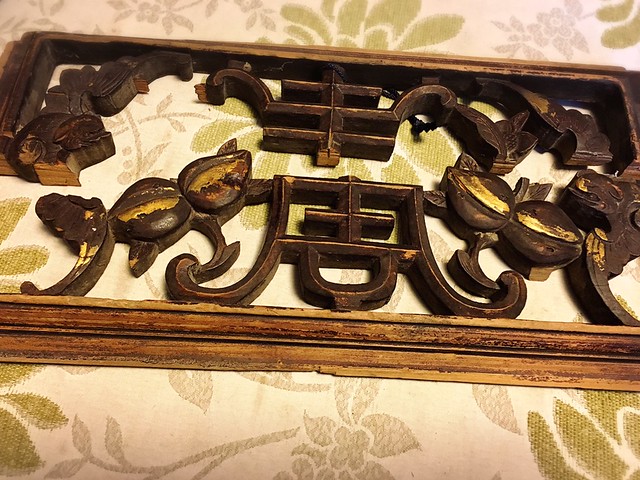
I've been working for awhile on a story-like version of this topic: true events told in a narrative about my time away from Taiwan in 2014 and 2015 and subsequent return. But recently two people I know (a friend and a friend-of-a-friend) have taken or will take similar flights, so I felt like writing something more essay-like about it now. Look for the story in a month or two.
Most recently, I returned to the US for one week in order to attend a family reunion, as well as pack up my entire childhood. The reunion and other family visits were especially important as I have two living grandparents, both of which are near 90 and neither of which is in good health. It is a painful fact that every visit I make home could be the last time I see either or both of them.
In 2012, a few years before my mom passed away, she had expressed an interest in the various old and attractive, but not particularly valuable, antique decorative items I'd purchased for my apartment in Taiwan: mostly old carved wooden panels used to decorate the tops of walls and under eaves in houses and temples. So, I bought her a similar panel with carved peaches (symbols of long life) and a stylized 'long life' (壽) character, as we were returning to the US for Christmas that year. It turned out to be our final family holiday together before she passed away in 2014. The irony of this does not escape me.
This past week, after learning that our dad planned to rent out our family home and the house I grew up in for at least a year, and potentially sell it after that time, I asked if I could have the panel rather than see it go into storage. It was an easy request as I'd purchased it to begin with.
With too much in the suitcase, including books, large photo albums and other items, the fragile wood of this panel just couldn't take the pressure. As I was closing the back, I heard a crack. The cut was not a complete severance and could be repaired, but I didn't want it in that suitcase. I put it in my carry-on as gingerly as possible, only for the breakage to complete itself as that bag, too, was overstuffed.
When I took it out of its (inadequate) padding back in Taipei, only to see it completely severed, I was reminded of a favorite song of my mother's which my uncle sang at her memorial service:
A time to build up, a time to break down
A time to dance, a time to mourn
A time to cast away stones
A time to gather stones together
I couldn't help but draw some weird symbolic analogies to my long-term expat life - literally as far away as it is possible to go from my hometown - and that antique wooden panel. Bought in Taiwan, gifted to my mother in the US, only for its hope of long life to be dashed in a few remaining years and to crack on the way back to Taiwan, as I leave the home I grew up in quite possibly for the last time.
As you know if you read this blog even semi-regularly, my flight home in 2014 was sudden: I'd planned on leaving for up to a year, maybe two, but wasn't scheduled to depart on the day I did. I knew as I left for the airport with a few hours' notice that whatever happened would not be good: I didn't know if I'd have a few hours, a few days, a few months or a few years with my mom, but no matter how long I did have, I knew I was flying back to the US to say goodbye. As it turned out, within two days, maman est morte.
Less than a year later, just before I was set to return to help my father after his heart surgery, I lost my grandmother somewhat suddenly (we'd known it wouldn't be long but we didn't know it would be quite so soon).
What I've become more aware of in the intervening year and a half is that I am not nearly the only expat or immigrant who has experienced that situation. Many of us who live abroad long-term and likely some of us who don't stay for that long in the grand scheme of things take that same flight. They're lucky in a sense if they do: not everyone can. I could return for my mother but there was no way for me to have done the same for my grandmother, as much as I wanted to.
It's a part of expat life that few talk about: if you choose to live far away long term, there is a chance the next time you see your loved ones 'back home' might be the last time, that you might have to take an unplanned 12-hour flight to say goodbye, or that there is a chance you could be half a planet away knowing there is nothing you can do.
What is even less discussed is the feeling of breakage that comes from this time away. Many of you know I no longer consider the US to be my home. I haven't for awhile but haven't been able to articulate it until recently. We may not stay in Taiwan forever - let's see if this country can get its act together on immigration and labor reform - but if we leave it will be to go forward, to somewhere new. I am married to a Canadian citizen after all. But if you plan to go forward that necessarily means you won't be going 'back', though it feels cruel to put it that way. If you don't go back, a crack forms between your life before and your life ahead. Given time, and despite one's best efforts, the crack will eventually turn into a break. Even if you keep in close touch with people back home, the number of times you will see them again in your life is reduced by your living so far away, and the amount of time you will spend with them before they, too, leave either your life or this world is necessarily less.
Does that 'goodbye' flight make up for such a trade-off? You must go forward, or at least, I must. The answer is not to stay behind, but you must also be aware of the consequences. You do not know when your 'goodbye' flight will come, or if you will be able to take it. You don't know when the crack will form, or when it will turn into a severance. You can pack as carefully as possible, pad yourself against all manner of unfortunate events, but they will find you. None of us living abroad are exempt from the 'goodbye' flight. None of us are exempt from the breakage.
It is easy, while living a relatively charmed existence in Taiwan, where my salary (as much as I complain about it, with reason I think) affords a comfortable lifestyle of downtown living, further education and travel, to pretend that every time is a time to dance. To pretend that I am a 21st century Meursault - that we are all little dancing Meursaults staring at the sky or the sun or whatever - that nothing between humans matters as much as the immediacy of life and nature, that only the constant forward-moving pace of the universe makes sense and nothing else can be explained rationally.
But, whether or not there is truth in such absurdity, human relationships do matter. You make new ones abroad: it's fairly common to write about this positive side of expat life. You meet all sorts of interesting people, not least among them local residents of your new country. And we all know that our relationships back home may cool due to this distance. But we like to pretend that there is no permanent consequence to this moving forward, that good relationships can always renew themselves. Generally, they can, but only if the people you leave behind are still alive when you come back.
This is an acute feeling while you are actually home. Living in the US in 2015 was like functioning with my arm chopped off (left or right, depending on the day). I was still alive, in a great deal of pain but able to get through the day and even keep other peoples' lives together as I planned my mom's memorial service, but something was just missing. I wasn't able to function normally due to this missing thing, this absence where there should be presence. Living in Taiwan, it's easy to forget that it happened at all. Any given day now in Taiwan is no different from any given day before late 2014 when I might not have talked to my parents (we talked frequently, but not on a daily basis).
It would be easy to pick right back up as though life was as before. It's almost eerie how nothing in Taiwan has changed even as I know rationally there is no reason for it to have. That's the other side of the expat life coin: after a monumental change or loss where you come from, the only change you see when you return to your country of residence is in you.
Back 'home', things have changed quite a bit. Others feel your loss, or rather, that loss is also felt by others. Their possessions are still around, in many cases. Whatever they built in their life still is, too. People offer memories or sympathy. The place where they lived, where you come from, has changed, even if just a tiny bit. Return to your new home, and that loss is not felt by most others (in my case, my sister - also in Taiwan - and husband were mourning, too). They can't miss someone they never knew, and a place that person never set foot in obviously wouldn't change because they are gone.
It's tempting and easy to try and avoid returning to a place where you feel your arm has been cut off by staying in a place where you can be whole-bodied if you want to be. To pretend that the breakage you've suffered, the human relationship you've lost, doesn't have as big an impact because it doesn't impact the immediacy of life and sensation in your new home.
I can't do that though. I don't regret moving abroad (it would also be easy, but futile, to wallow in regret). It is natural to move forward. To seek your fortune, in whatever form it takes, wherever it can be found. Go East, young woman.
In order to atone for all of the time I didn't spend where I grew up, that I didn't see my mother or grandmother, all of the times I wasn't there rolled up into one goodbye flight I could take and one I couldn't, and to acknowledge that the same circumstances will present themselves again at some point in the not-too-distant future, it sometimes helps to spend some meditative time with my arm, figuratively speaking, behind my back.
So, today I broke out my arts and crafts tools, including the appropriate type of glue to repair wooden items, and set about gluing that antique wooden panel back together so I can hang it in my apartment here in Taipei.
The break will always be noticeable: it's my own fault for trying to carry it to the US and back in the first place. But then if I hadn't gone abroad I wouldn't have bought the panel at all. My mom knew that my move abroad was my own move forward and, as hard as it was, supported it.
Sunday, July 31, 2016
City of My Heart: Part 2
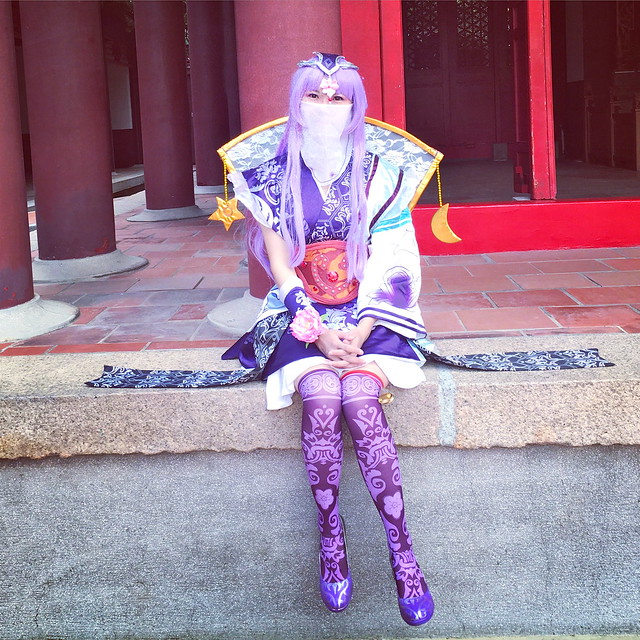
So, a few months after we took our cousin to Tainan and Yanshui, I had the chance to return thanks to work. I was sent to Tainan for a seminar at an accounting firm, and fortunately it was on a Friday. As I have a fairly flexible schedule, I was able to arrange to stay for the weekend. I finished my seminar at 1pm, took a taxi to our hotel. It was a cute youth-ey hostel-y type place called Right Now B&B, a short walk from Chikan Towers but a bit north of the heart of the city - the actual hotel is nice in a 'young people vibe' sort of way, although the building it's in is a bit grotty. We booked this instead of Tung Ning, which I had liked, because the private rooms at Tung Ning seemed to already be booked out.
Something that never happens to me in Taipei: the manager, a young woman, was really beside herself as she had never met a non-Chinese person who could speak Chinese before. I was quite literally the first person who didn't look like her whom she had ever met who spoke her language.
I meet people who are surprised I can speak Chinese all the time in Taipei, but none who have truly never met another foreigner who could do so.
I set out from the hotel with lots of time to kill before Brendan arrived. I didn't want to do much as the weather was too damningly hot to be out and about. I wandered past the 2nd city god temple, the 縣城隍廟 (the famous one is on the other side of town and has a slightly different name - this one is north of Chikan Tower), where a friendly man showed me around and gave me his name card if I needed any help in Tainan. Interestingly, this temple boasts a pair of fortune blocks that are preserved where they last fell, as one of them had fallen on its side, rather than on its curved upper side or flat underside.
I wandered down past Chikan Towers - I didn't enter, as I'd been there just a few months prior - past a few other temples that I hadn't visited before. I popped into one and found this box of random temple paraphernalia on the floor by the tiger god idol:
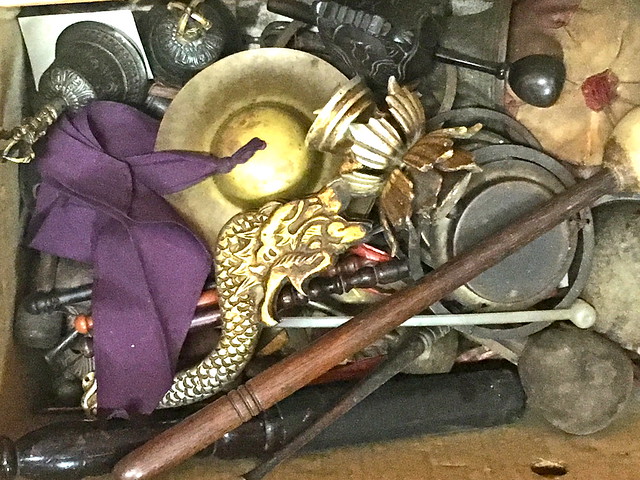
As well as this dude who is a pretty bad-ass gangsta:
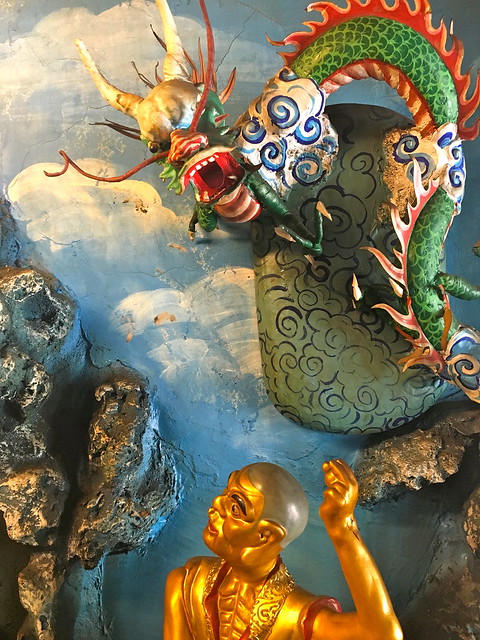
And the slightly creepy Tiger God himself:
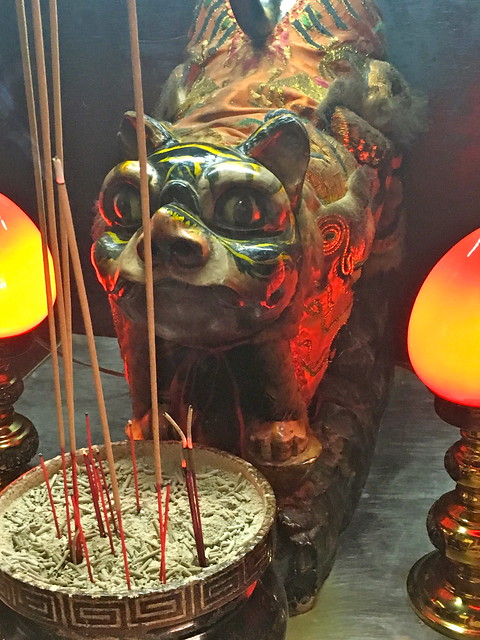
This is terrifying:
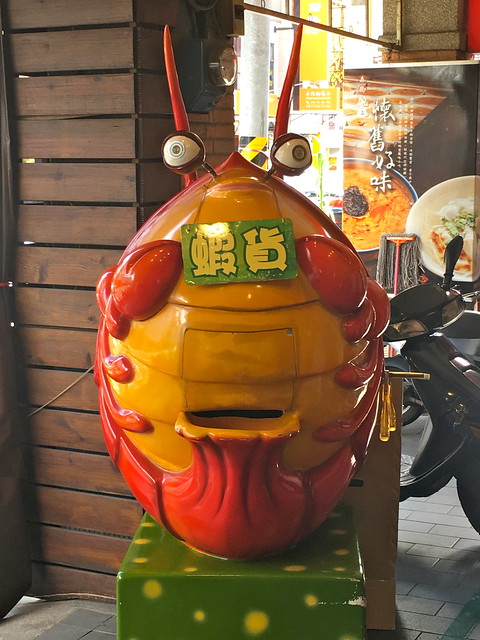
But I love the photo opportunities at this Ximen Circle lantern-maker's shop.
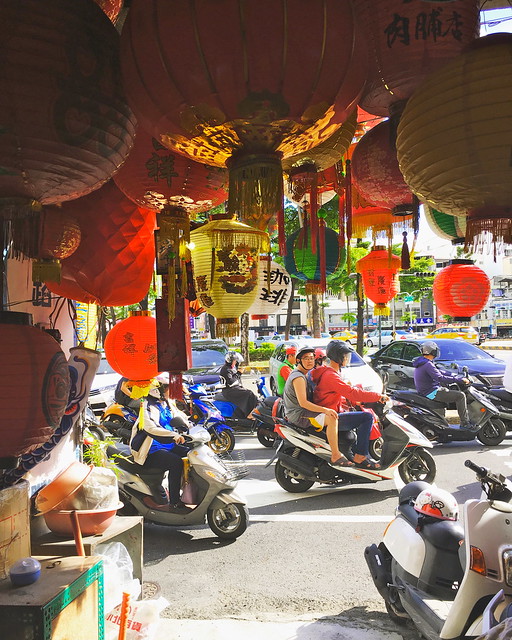
I ended up, at the hottest part of the day, at the famous Taicheng Fruit Shop in the now super hip (in that distinctly Taiwanese hippie-organic way) West Central District. Taicheng serves handmade fruit ice cream - more like a sorbet really - served in half a cantaloupe.
HALF A CANTALOUPE YOU GUYS.
You get four choices of pre-selected combinations of ice creams. The most popular appears to be mango and grape, but other ones include dragonfruit, kiwi, lemon, banana and more. I am fairly sure I saw strawberry in one of the selections. I gather it changes seasonally to some degree based on what's fresh and available.
I got the well-loved mango grape:
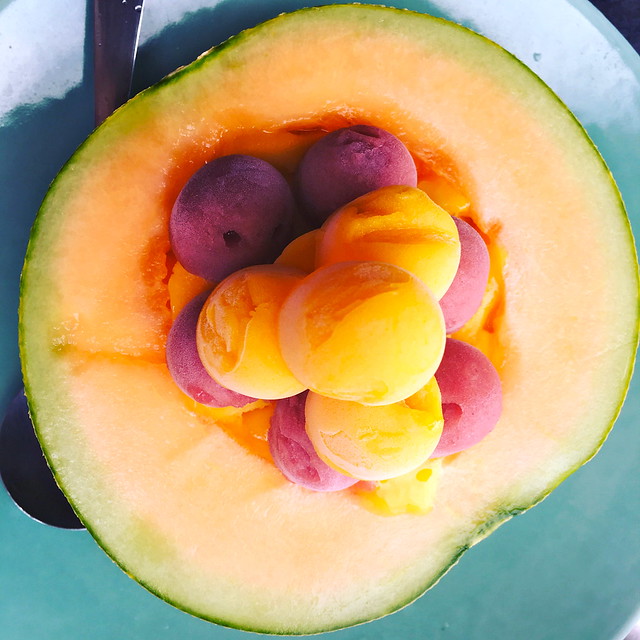
AND LET ME TELL YOU IT WAS HARD NOT TO FACE PLANT INTO THAT THING AND JUST EAT IT LIKE A LABRADOR WOULD EAT A RASHER OF BACON (or to be honest, like I would eat a rasher of bacon).
Yummmmmmmmm
I ate it as my lunch, forgoing anything savory because it was just too hot to contemplate eating anything other than something ice cold. Be prepared though: there is usually a line. Best to go on a weekday if you can. This is not a quiet little place I discovered - it's firmly on the local foodie tourist's map and is one of the hottest food destinations in Tainan right now (so my seminar students told me).
Taicheng Fruit Store (泰成水果店)
#80 Zhengxing Road
West Central District, Tainan
台南市中西區正興路80號
I then wandered down to Shennong Street (神農街) which I discussed in the last post, only to find that, sadly, the place where I had had those delicious noodles - Vegane - seemed closed for good. Another well-known cafe, Funny Wenqing, was also closed permanently. As it goes...
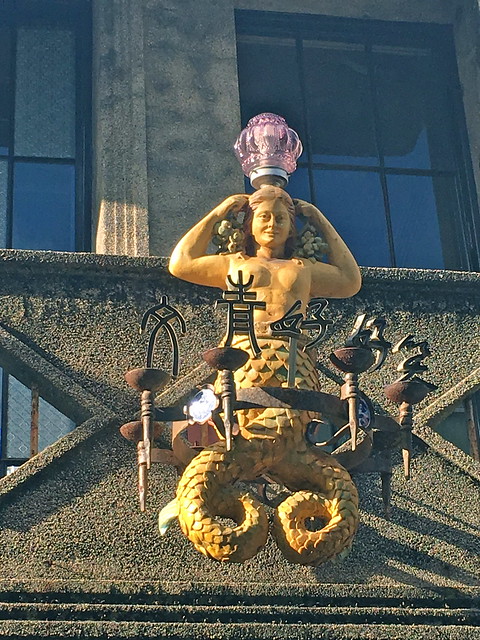
I ended up at Taikoo (covered in the last post) where I could drink something cold and caffeinated and watch the young hipsters and tourists go by as I read up on learner autonomy for my article.
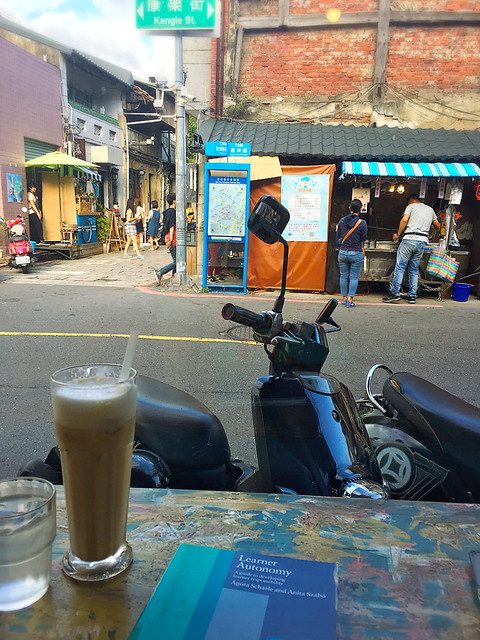
...before walking back to my hotel, via a shop that carves idols (presumably for temples). Faceless idols, I have to say? A bit creepy.
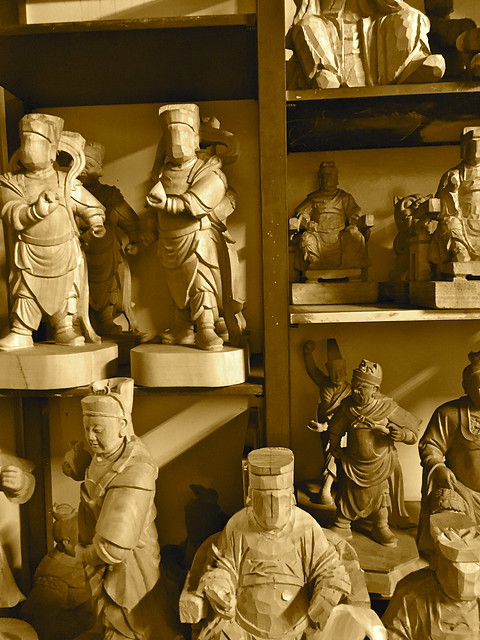
The next morning Brendan and I walked down the western end of Chikan Towers (Chiqian Street on some maps, Chikan Street on others?) looking for coffee, and found it here, at More Cafe:
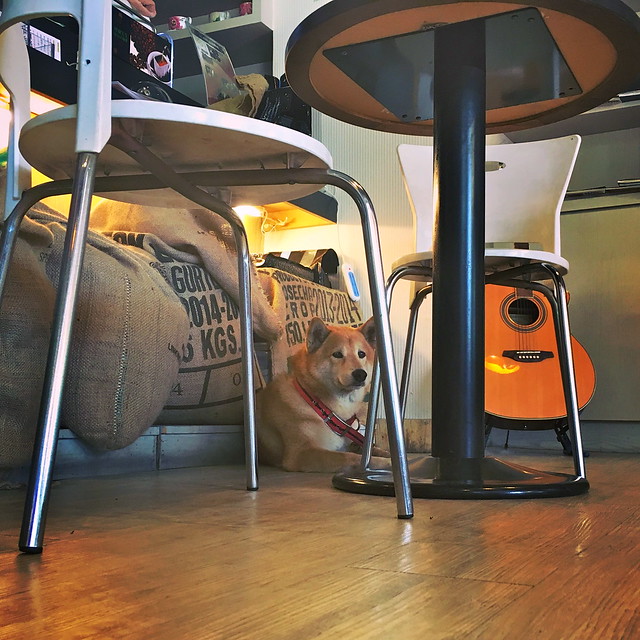
Tainan is full of cafes and this one just happened to be the shortest walk from our hotel, but they do have a great selection and use good beans. They make a good cup, and are very close to one of Tainan's key tourist sites. Also, they have an adorable but standoffish shiba inu who only let me pet him on the 2nd day we came.
More Cafe 摩爾先生咖啡
Chikan Street #47, West Central District, Tainan
台南市中西區赤崁街47號
Almost next door is a place where downstairs they sell hand-designed jewelry (mostly silver) and upstairs they have a restaurant, coffeeshop and beer cafe, with 2 pet cats. Worth a look!
While we were hanging out at More on the first day, a processional passed by - this tiger god was going to visit the city god temple nearby (again, not the famous one). Brendan stuck around to enjoy his coffee and the air conditioning while I followed the temple parade.
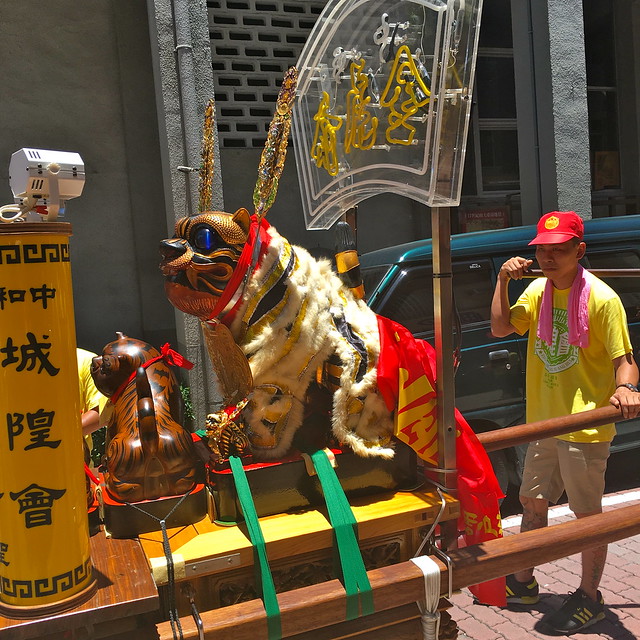
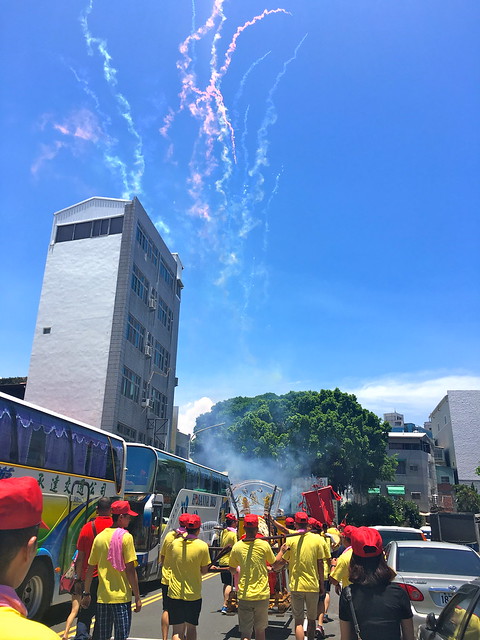
Two spirit mediums were using this instrument to write "god characters" on a slate covered with sawdust, walking it over a fire just outside several times.
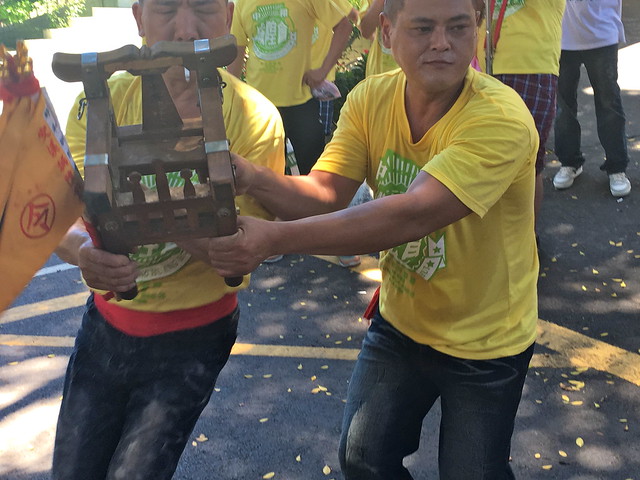
There was a Ji Gong (spirit medium who is said to be possessed by a monk who lived centuries ago - real person! - name Ji Gong, who was kicked out of his monastery for eating meat and drinking alcohol. He wandered the streets and dispensed spiritual advice, eventually becoming a god-like figure/immortal spirit himself).
This one was a friendly fellow who let me drink a fair amount of rice wine (the medicine gourds these guys carry when they become possessed are filled with real wine, and it is good luck to drink it).
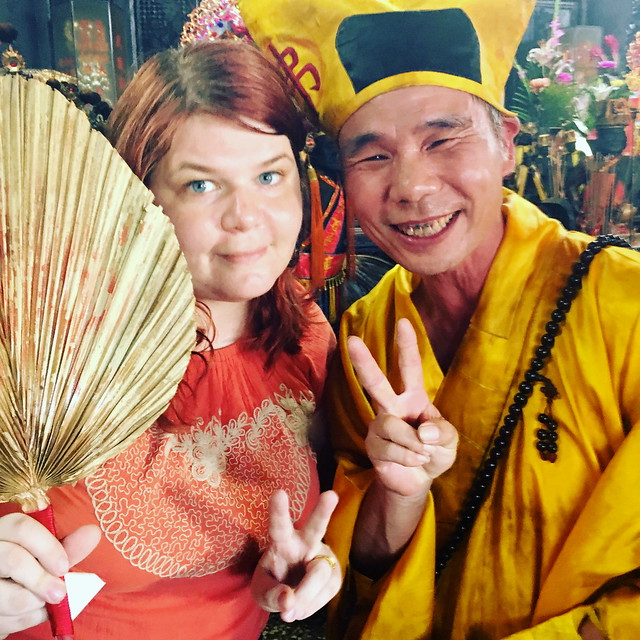
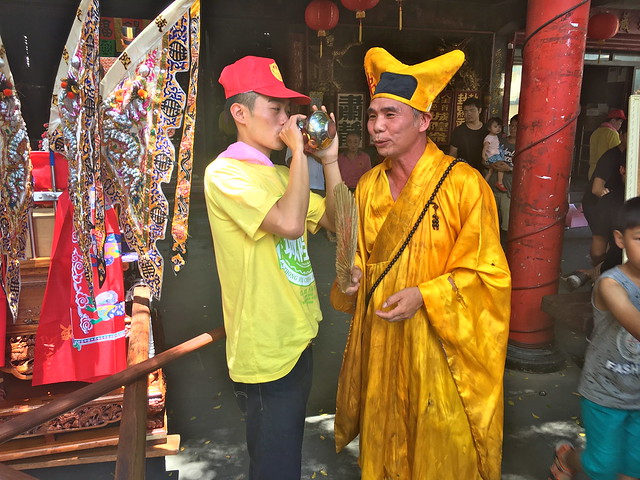
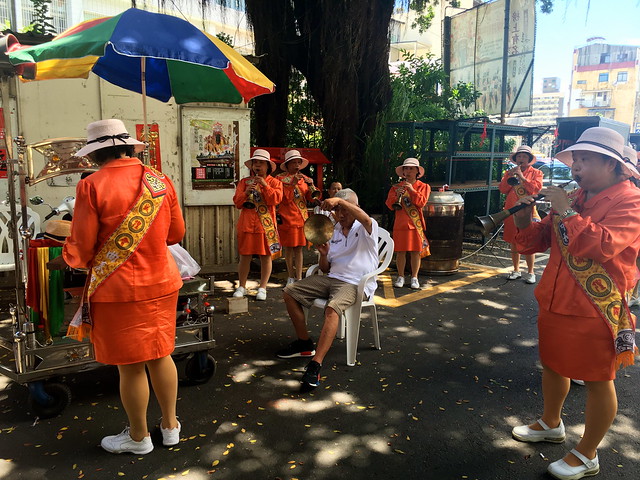
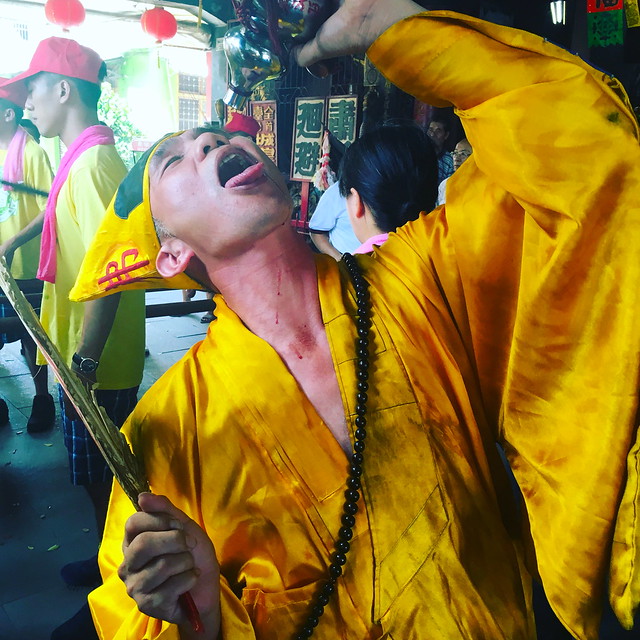
A bit more wandering after I returned to the cafe to fetch Brendan brought us to this inert comedy dog:
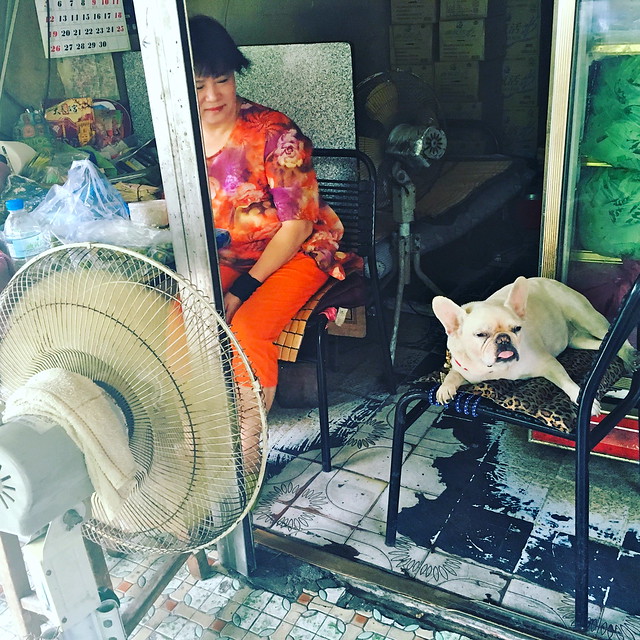
Then we ended up at 開基天后宮 (Kaiji Matsu Temple), a small temple that, while not as famous as the major Matsu temple on the other side of Chikan Towers, is scenic, historic and quiet.
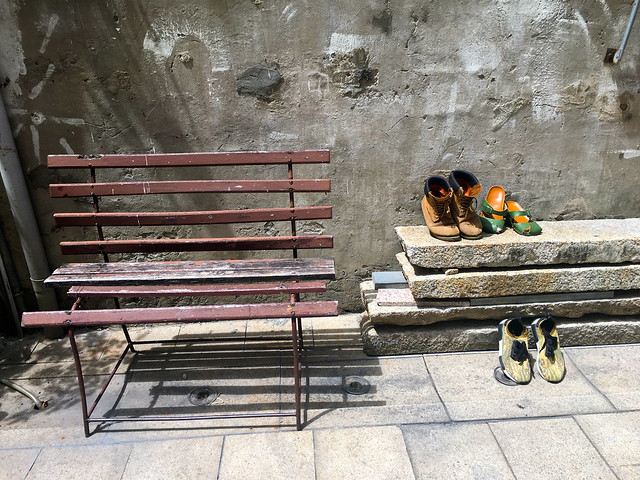
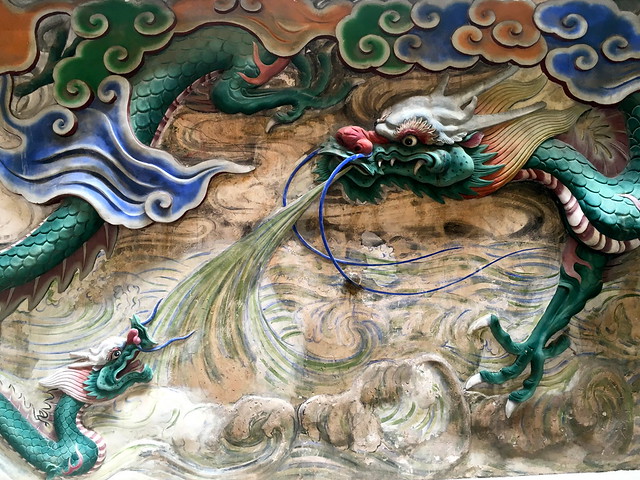
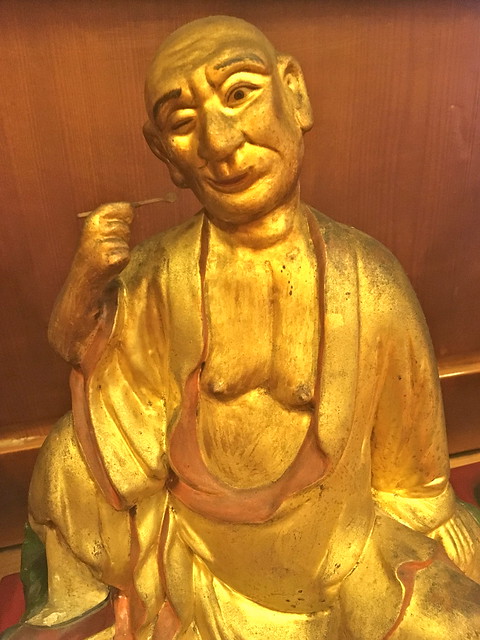
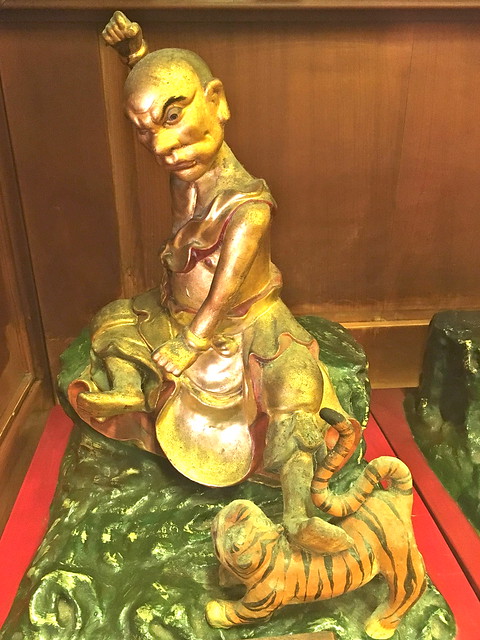
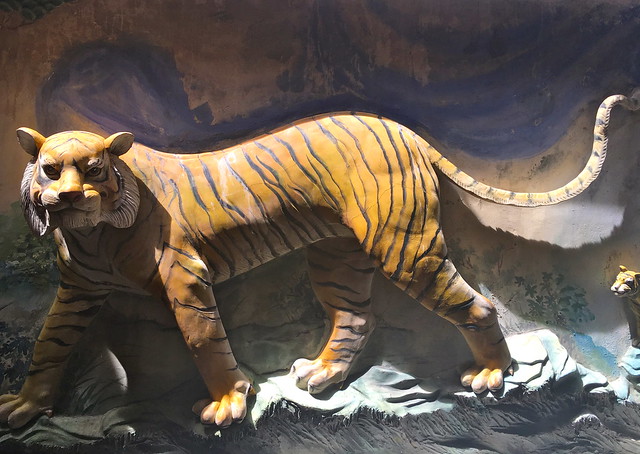

We also passed a temple under restoration. If you were ever wondering how they put together those mosaic figures that top temple roofs, this is how:
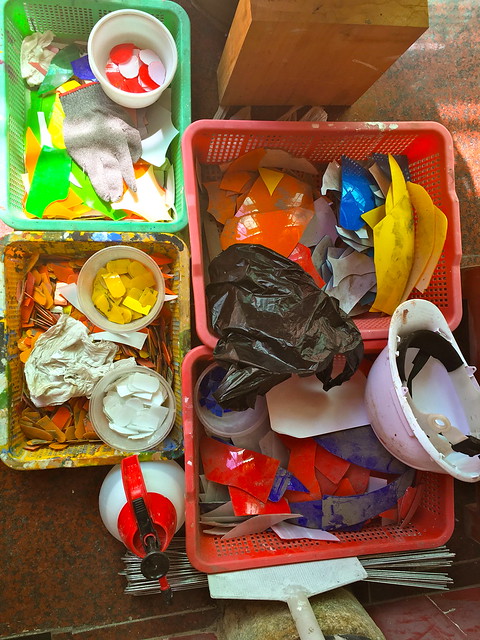
South of the larger Matsu temple we found an old movie theater still in business, still using hand-painted posters, the Jinmei Theater (金美戲院)
Jinmei Theater (金美戲院)
#187 Sec. 2 Yongfu Road
West Central District, Tainan
台南市中西區永富路二段187號
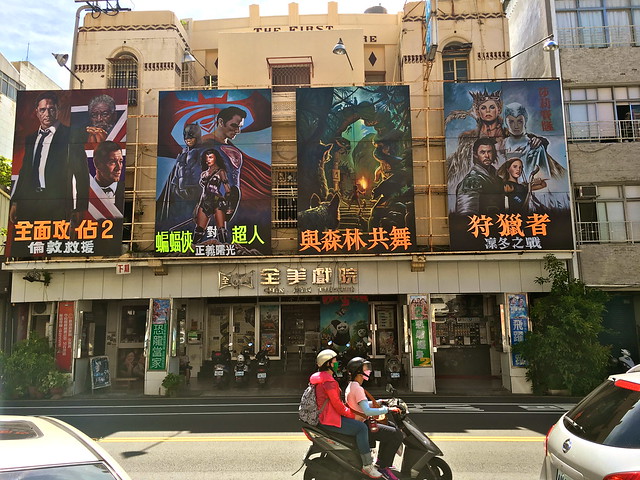
Also this creepy-ass Line character head mannequin formal dress thing:

I took Brendan to Taicheng Fruit Store, because I just had to share how damn good it was. This time I got red dragonfruit, kiwi and lemon ice cream in HALF A CANTALOUPE YOU GUYS.
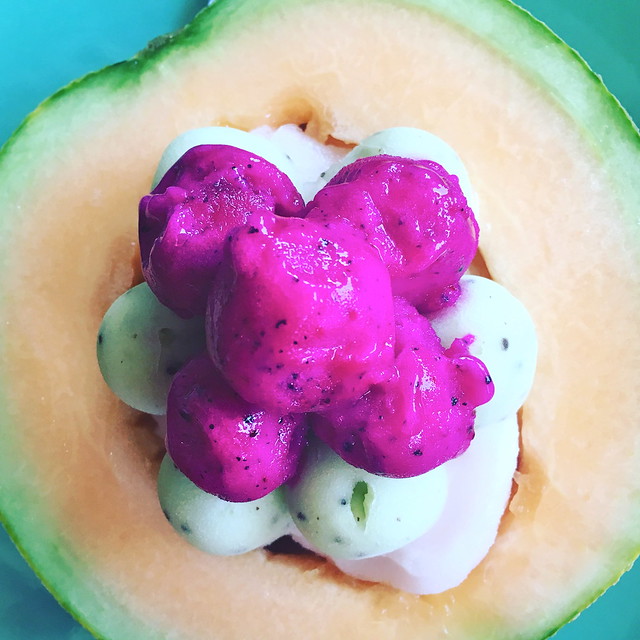
We walked around the market near Zhengxing Road, where a concentration of little shops and cafes has set up, before catching a cab to the Five Concubines temple (五妃廟)further south - the only temple in Taiwan with female door gods:
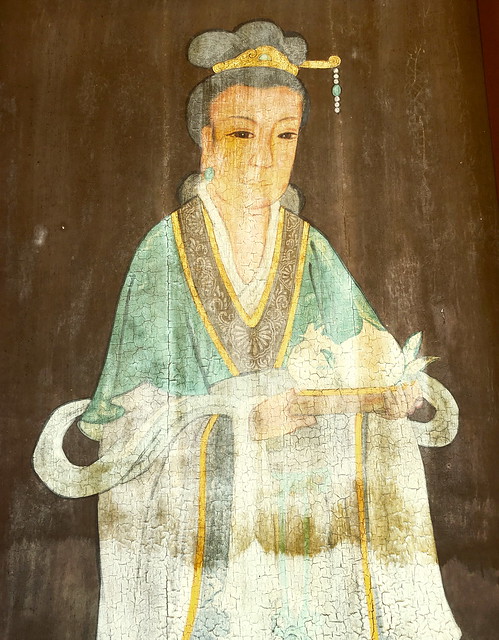
I don't think I need to google map link this one, it's one of the most famous temples in the city, erected to memorialize the five concubines of a late Ming dynasty official, Zhu Shugui, who hanged themselves in what is now the Matsu temple (the big one by Chikan Towers) rather than be captured by Qing forces. Their grave is here, behind what is now the temple.
Notably, the shrine to the five concubines has some offerings that concubines would probably appreciate:
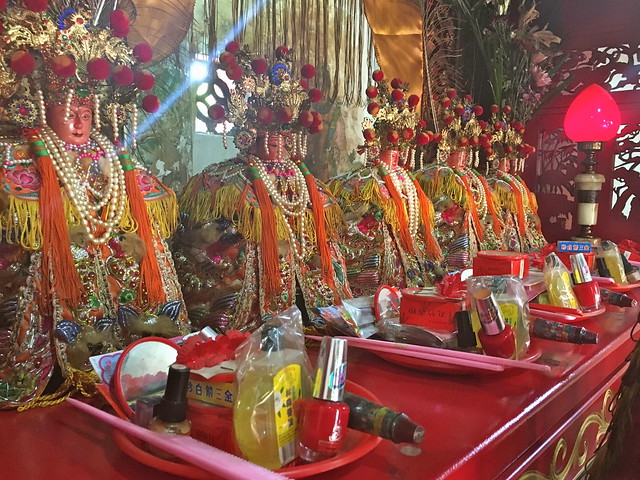
All of this going around in the heat tired us out, so we walked up to Narrow Door Cafe, ((窄門咖啡)close to the Confucius Temple. You walk in through an impossibly narrow alley, up some weird stairs and through the lobby to this place, which is wonderfully old-fashioned and seems to be a gathering place for people to talk civilly about politics (at least from the conversations I was overhearing from other tables).
Narrow Door
#67 Nanmen Road
West Central District, Tainan
台南市中西區南門路67號
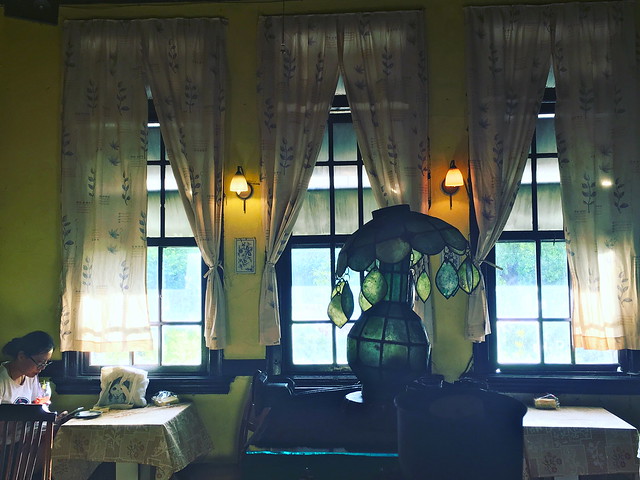
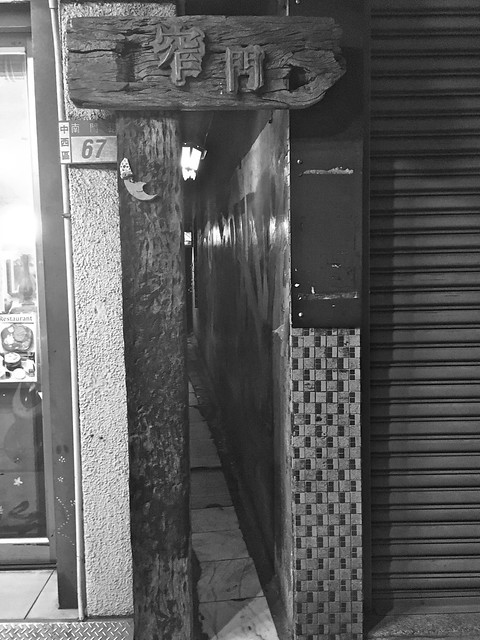
The next morning we went back to the same cafe, noting the random urban rooster along the way:
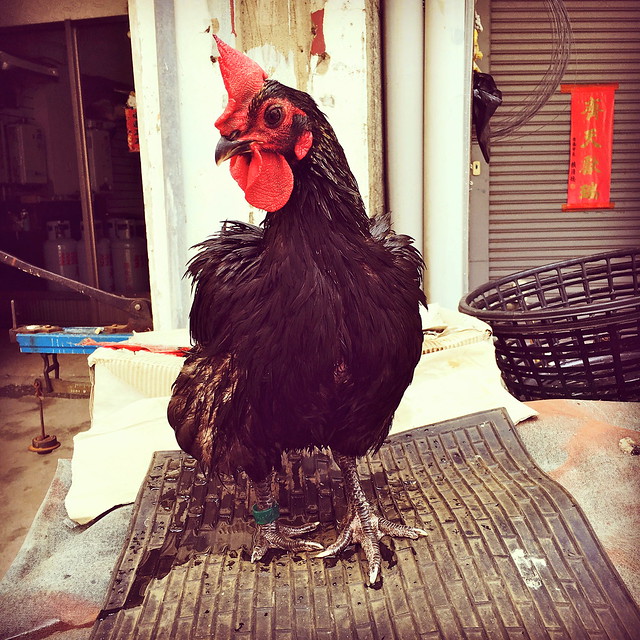
We then hopped a cab to the north of the city to Kaiyuan monastery in the north of town, a little far to walk. It's a peaceful place with a few areas where you can sit and relax, and friendly monks and nuns. There is also an old well and a statue of the last Japanese governor (I'll go double check exactly who and then update here) in a side room.
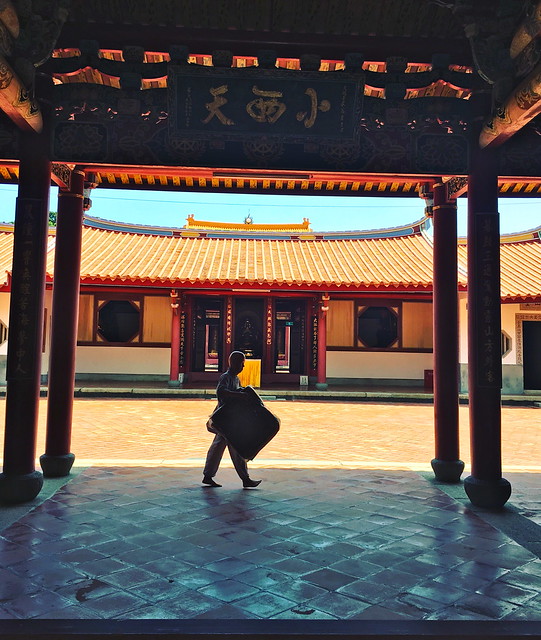
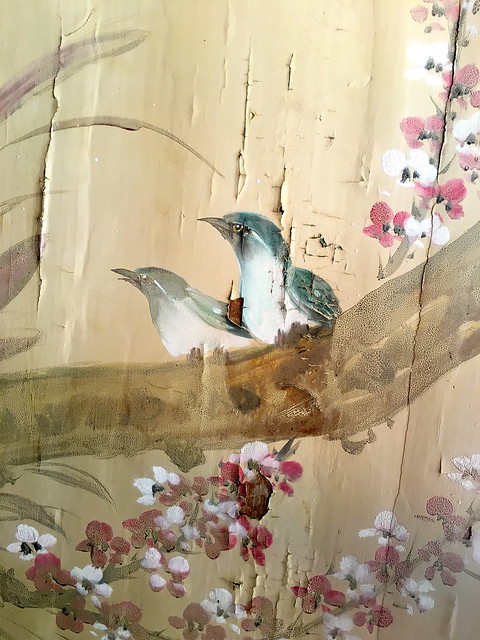
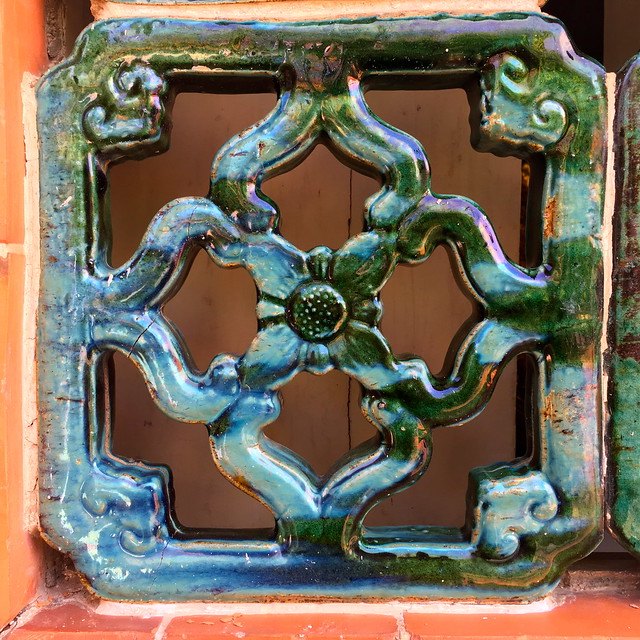
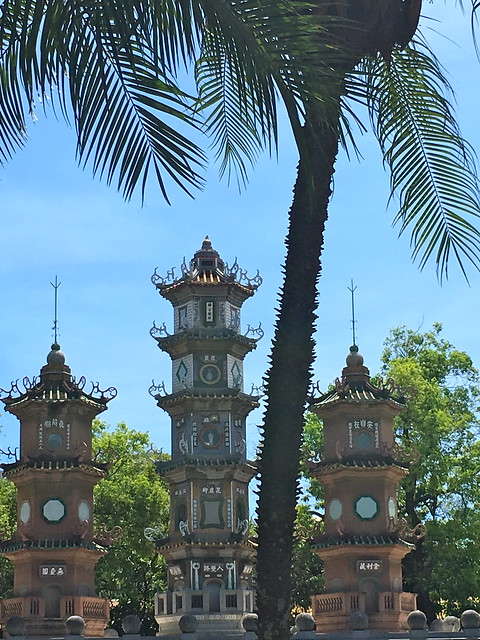
We met a Scottish friend down by the Five Concubines temple again but this time walked a short distance to the Fahua Monastery, which is in a rather striking state of disrepair in parts.
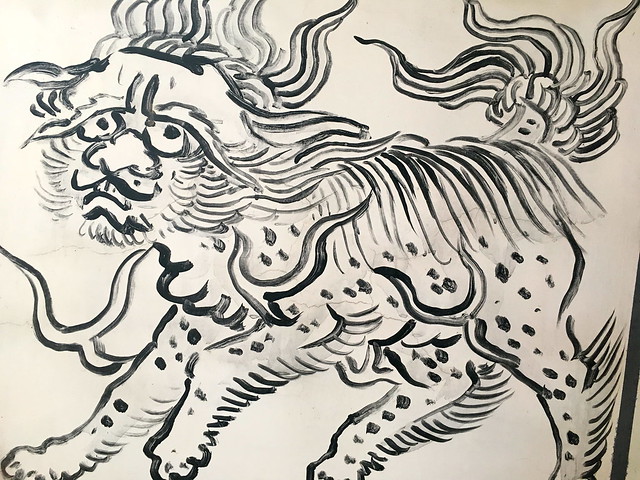
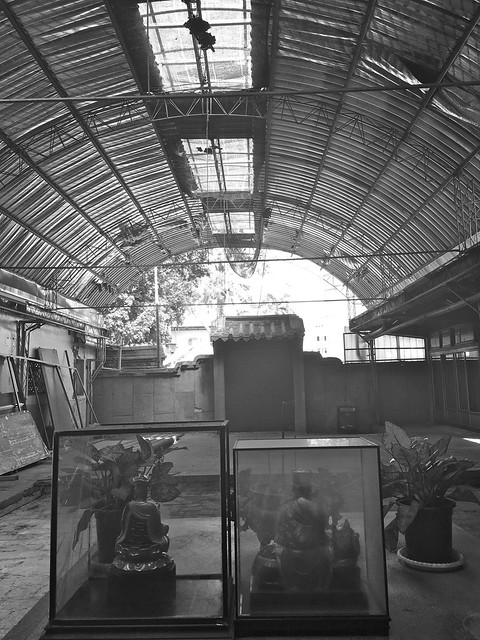
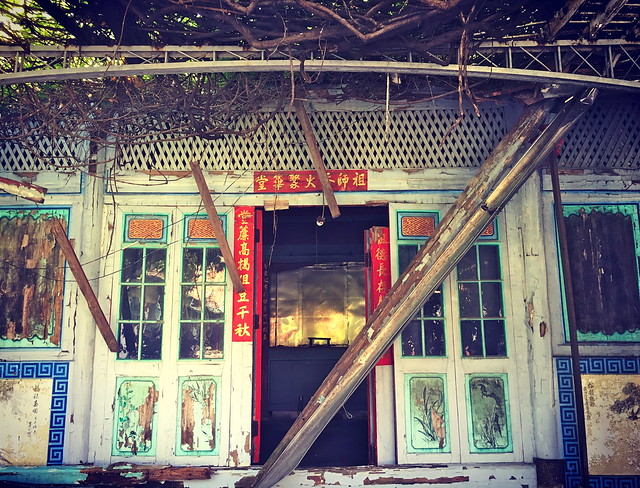
Before walking north past the large Koxinga shrine, where I made my usual wish, now sprinkled across various temples in Taiwan:
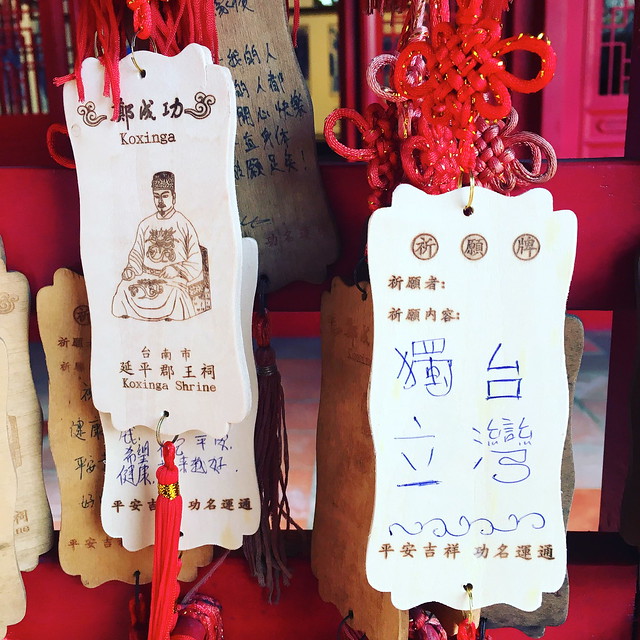
But my wish was not as cool as Ivan's wish.
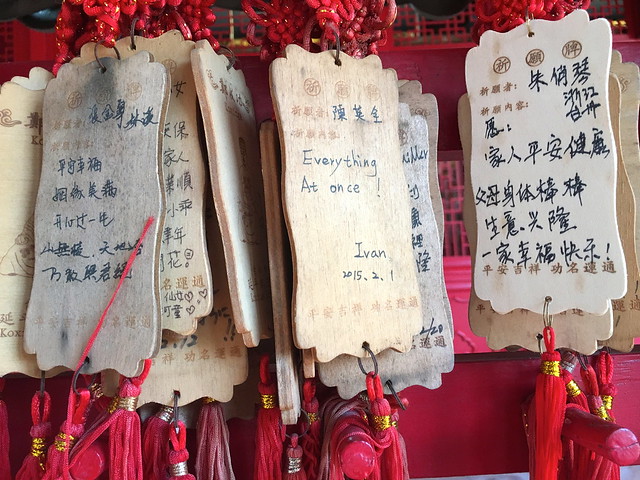
Rock on, Ivan. Rock on.
We had dinner (Zhou's Shrimp Rolls, originally from Anping, there's a franchise not far from the train station) with our friend before he went off to a baseball game with other friends.
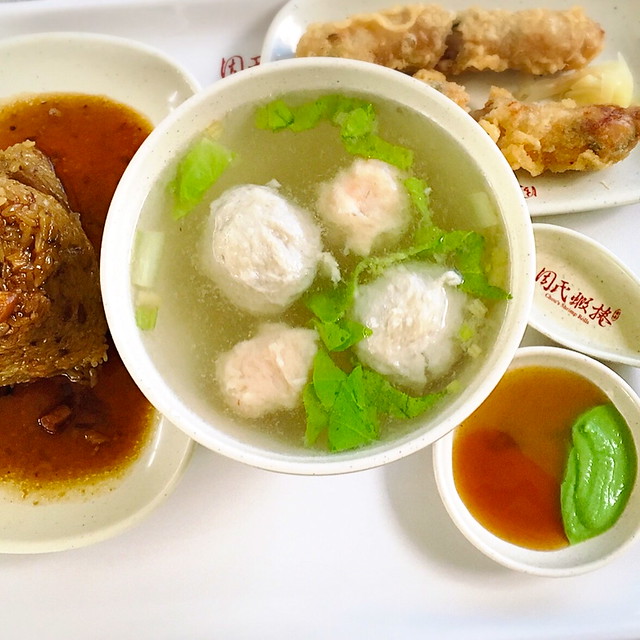
We then walked to the Lin Department Store, because there is a cafe on the top floor where we could get dessert and beer, passing a few interesting things on the way, including this hideous church:
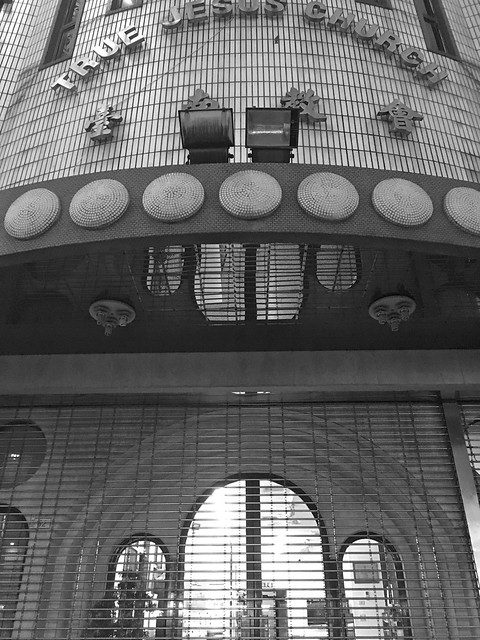
And a smaller Koxinga shrine which I think is prettier lit up at night:
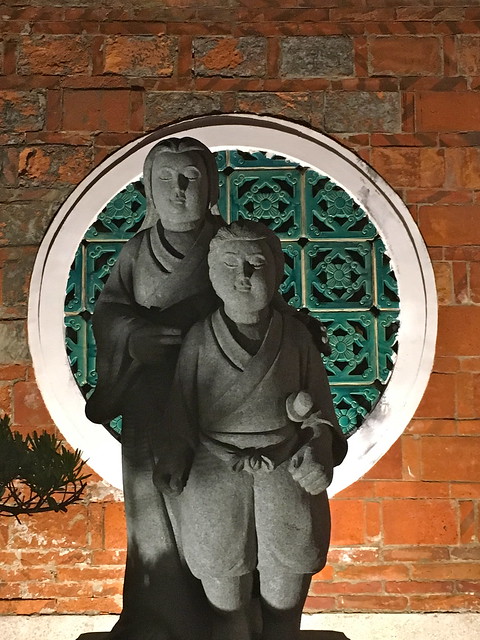
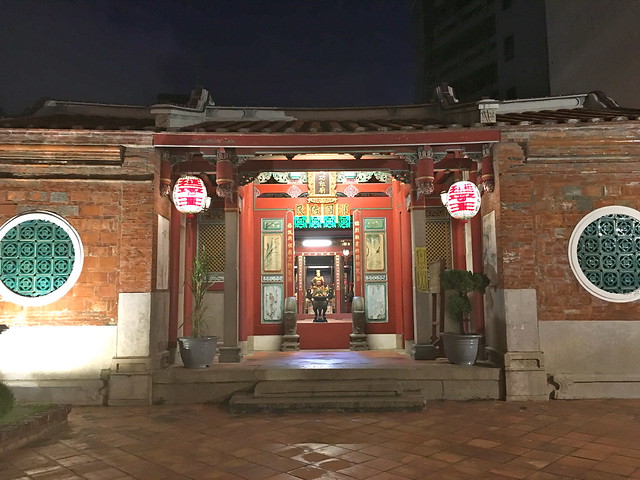
The Land Bank's exterior is also creepy and cool at night, with BATS. Terrifying, squawky bats.
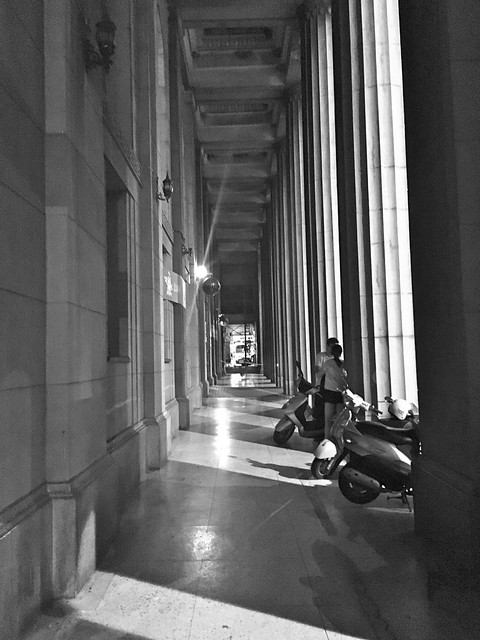
All in all, fun times. What I liked was the chance to just chill, not cart ourselves around to all sorts of different things and places unless we felt like it. That's the true magic of Tainan - it's a city, but it's relaxing. You can go there and chill.
Subscribe to:
Comments (Atom)
